
In January 2018, Toyota SA recalled more than 700,000 vehicles over airbag safety concerns. In 2017, Mercedes-Benz recalled 2200 units in South Africa related to issues with engine compartment seals, as part of a larger global recall affecting close to 1 million cars worldwide.
Ford faced a PR crisis of note after several of their cars, notably the Kuga, were recalled following car fires and one death. It has left many concerned drivers wondering whether cars are becoming more dangerous and if so, why?
Jeff Osborne, Head of Gumtree Automotive, says that while it seems that cars are more dangerous than ever, the opposite is true.
He said: "No one is denying that these defects which led to the recent recalls, particularly the airbag defect, are extremely dangerous. They have been linked to tragic deaths and injuries and cannot be treated lightly. However, on the whole, the recalls that have plagued the industry are extreme measures designed to make cars safer, not an indication that the cars are unsafe. Some of the Toyotas that have been recalled date back to 2002 – those cars have been on the road for more than a decade without incident."
Osborne believes that automakers might have neglected, delayed or even ignored warnings from customers in a different era.
He said: "In the last five years, we've seen massive fines issued over safety missteps, not to mention lawsuits and bad publicity. It has forced automakers to put serious preventative measures in place. 'In 2014 alone, 1 in 5 vehicles issued in the United States were recalled – a previously unprecedented amount."
It has changed the way automakers approach safety for the better. There are improved systems in place for reporting defects, alerting the public and actioning recalls. The result is safer roads, safer cars."
Another factor at play is the globalization of the industry.
Osborne said: "The production of parts are being outsourced to numerous companies, all around the world. These plants are churning out parts in massive quantities, for various automakers. It has its benefits (notably, lowering the cost of parts), but mass production of a flawed production leads to a mass recall. Japanese manufacturer Takata produced the faulty airbags that led to the Toyota recall. They produced over 50 million of those defective airbags, installed in 37 million cars. The result? A massive, multi-brand recall."
Thirdly, Osborne states, some of the "blame" for an increase in recalls can be laid at the feet of technology. "Modern OEM's have managed to radically shorten the development and testing time of new models. Instead of testing a component in real time and use, they can now virtually test, by assimilation and calculation. Good news is that consumers get the latest release a lot sooner, but reality is there is a likelihood of component recall."
Osborne says the source of concern is not that recalls occur, but how they are handled. "Total transparency and swift action is required. Cars are indeed a whole lot safer and reliable, and getting better all the time, so there is no need for panic if you are served with a recall notice. The alternative is an industry where flaws get swept under the rug – and that's the real danger."




 Publications
Publications
 Partners
Partners











